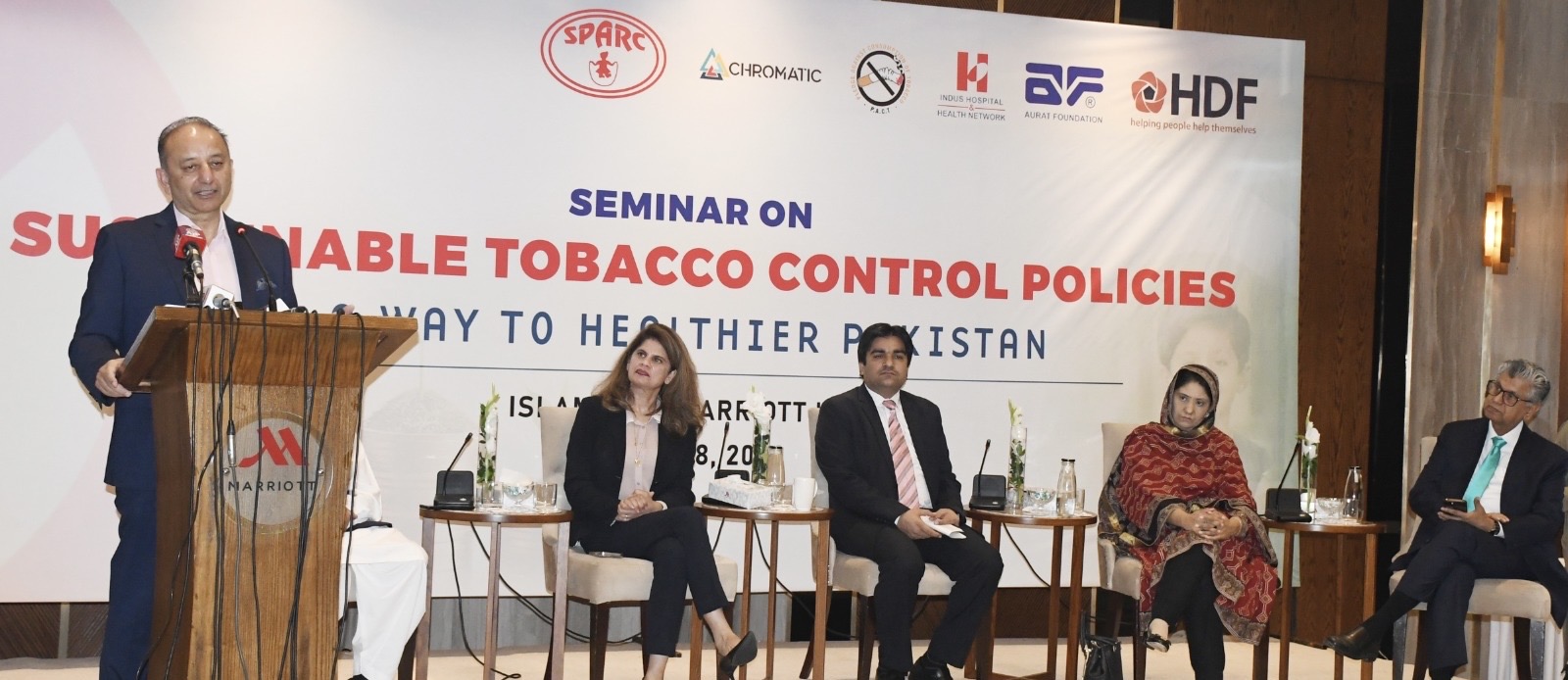 Islamabad – October 18, 2024: The Society for the Protection of the Rights of the Child (SPARC) organized a seminar titled *”Sustainable Tobacco Control Policies: A Way to Healthier Pakistan.”* The event brought together government officials, public health advocates, civil society members, anti-tobacco activists, and youth leaders to address the growing tobacco epidemic in Pakistan and advocate for comprehensive policy reforms.
Islamabad – October 18, 2024: The Society for the Protection of the Rights of the Child (SPARC) organized a seminar titled *”Sustainable Tobacco Control Policies: A Way to Healthier Pakistan.”* The event brought together government officials, public health advocates, civil society members, anti-tobacco activists, and youth leaders to address the growing tobacco epidemic in Pakistan and advocate for comprehensive policy reforms.
In his keynote address, *Mr. Musadik Masood Malik, Minister for Petroleum, emphasized the importance of collective action against tobacco. He stated, “Smoking is causing overall harm rather than any benefit. The fight against smoking will not be easy, but it is crucial. The real fight against smoking is a fight against the mafia.” Highlighting the severe health implications, he added, “Smoking has the deepest connection with cancer, and there is hardly any disease that isn’t linked to it. Every year, 150,000 to 200,000 people die from smoking. Why can’t we see the faces of our people in those numbers?”
*Murtaza Solangi, Former Caretaker Minister of Information and Broadcasting*, emphasized the need to acknowledge tobacco as a national issue. “First of all, we have to see it as an issue; this is not even yet seen as an issue,” he remarked. He called for a unified approach, stating, “We have to create an ecosystem where media and everything around us reflects an anti-tobacco stance.”
*Public Health Advocate Dr. Maheen Malik* highlighted the increasing threat posed by emerging nicotine products like e-cigarettes and nicotine pouches, which are being marketed aggressively to youth. She called for stricter regulations on these products, stating, “We must treat these products as tobacco items and implement stringent advertising and sales restrictions to protect children and adolescents.”
*Dr. Khalil Ahmad, Program Manager at SPARC*, emphasized the deadly toll of tobacco use in Pakistan, explaining, “Tobacco use is costing 166,000 lives each year, which equates to almost 450 deaths per day.” He urged the government to take critical steps to curb tobacco consumption, particularly among the youth.
The seminar was attended by notable experts, including *Dr. Mati ur Rehman from the Health Services Academy*, who discussed the severe health hazards of tobacco use, explaining how it leads to life-threatening conditions and diseases. Muhammad Sabir, an economist from the Social Policy and Development Centre (SPDC), said that; “Higher tobacco taxes can not only generate significant revenue for the government but also make tobacco products unaffordable for children, thereby protecting them from the dangers of addiction.”
The event concluded with a strong call to action for policymakers to implement sustainable tobacco control policies. Discussions centered on raising taxes on all tobacco products to protect the health of Pakistan’s population, especially its youth.
Other key attendees included *Khalida Ahmad, Board Member of SPARC*, *Senator Sana Jamali, Nisar Ahmad Cheema, Parliamentarian, and prominent Anti – Tobacco Activists,* all of whom voiced their support for enhanced tobacco taxation and the policy change to reduce tobacco consumption.
Editor: Kamran Raja